Yeah, that whole Booker Prize challenge I pretended I was going to do? Well, I really meant to. I LOVED The Gathering, and re-reading Paddy Clarke, Ha Ha Ha gave me a whole new appreciation for it I didn't get the first time I read it. Then Atwood and her Blind Assassin had to go and ruin it for me. That, and the fact that I read the same 50 pages of The Inheritance of Loss no fewer than three times, after putting it down, reading something else and returning to it. For some reason I just can't get into it. So I put aside the Bookers and just read some books.
Since I last posted, I have read both Mercy and Nineteen Minutes by Jodi Picoult, A Thousand Splendid Suns, by Khaled Hosseini, Saturday by Ian McEwan, I, Mona Lisa, by Jeanne Kalogridis, The Almost Moon by Alice Sebold, and Loving Frank by Nancy Horan.
I figured out what it is I love about Picoult--it's when she writes from the point of view of a teenager. Somehow she captures the raw angst of needing to be accepted by your peers, understood by your family, and all that comes with that. This is probably why Mercy, which I expected to be very moving, left me underwhelmed and why Nineteen Minutes disturbed me and touched me on so many levels.
I thought A Thousand Splendid Suns was even more amazing than The Kite Runner, perhaps for no reason other than because it focuses on the lives of two women rather than men. It was the first book in a long time that I found myself sobbing over.
The others were good, but didn't move me enough to recall any specifics this far from when I first read them. Because I read mostly at night before bed, I end up retaining less than I should.
So I had intended to read 50 books this year. I managed 27. Eh. Having been given a $100 gift card to Barnes and Noble and considering Los Angeles has about eleventy billion public library branches to choose from, I am hoping to hit at least 30 books this coming year. Maybe I'll surprise myself and get to 35.
Of course, I am about 30 pages into Tolstoy's War & Peace right now, so maybe I should be just be happy if I can get through that before this time next year.
Monday, December 29, 2008
Monday, October 20, 2008
The Yiddish Policemen's Union, Michael Chabon
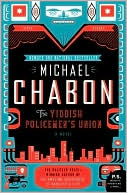
I wish I could say more about this book, but the truth is, I feel like I read it with only one eye and half of my brain. No fault of the book's, it's just been a long month, fraught with dying cats and sleep-allergic children. So much of my reading time has been done either at midnight in emergency pet clinics, or at the end of a long day that started out exhausted and therefore, I have only the vaguest memory of what I read the night before and it makes it hard to string the story together cohesively in my brain.
The premise, though? Fascinating. A Jewish state formed at the end of WWII in Alaska, of all places, is about to reach the end of it's "lease" so to speak and the Jews who have called Sitka home for decades are about to be, as Jews often are, cast once again to the four corners of the earth, on their own, with not official state.
The main character, Meyer Landsman, is a sad, neurotic shell of a man, grieving the death of his sister, and divorced after a personal tragedy tears he and his wife, Bina Gelbfish, (who ends up being his boss) apart. Along with his partner, Berko, who is half-Jewish, half-native Alaskan Indian, Landsman sets out to solve a murder of a man who seems to have been simply a junkie down on his luck, shot in the head in his hotel room (the same hotel, incidentally, in which Landsman resides).
With all odds against them, including the government for which they work, what Landsman, Berko and Gelbfish discover is that this mere junkie was actually a pivotal part in a plan born out of hope and desperation as the Jewish Sitka settlement approaches its reversion back to Alaskan control and almost certain eviction.
For imagination and the sheer beauty in his use of language, I am sorry my reading of Chabon's book doesn't do it justice. It is gorgeously written and parts of it are geniusly funny. The characters pay homage to a sort of 1940's detective noir style of development, but their circumstances are so surreal, they don't end up seeming trite or simplistic. The plot itself, of a Jewish settlement in the most unlikely of places, is a testament to the creative mind of Chabon, and the underlying sadness of the people, at home, but not at home, living under the false-illusion of control and stability for 60 years and now faced with almost certain eviction and the desperate reality of having no place to call home, while it's not lamented openly on each page, weaves it's way through each character and their stories.
Given how absent-mindedly I read this book and how much I enjoyed it, I imagine that had I read it with both eyes and all of my brain, it would have blown me away.
Friday, September 12, 2008

The Abstinence Teacher, Tom Perrotta
A fascinating cautionary tales of the dilemmas presented by extremism, Perrotta's book brings together the unlikeliest pairing of "heroes" in Tim Mason and Ruth Ramsey. Ramsey, a sexuality educator who insists on bucking the "abstinence-only" policy implemented by a predominantly Christian-right school board, finds herself head-to-head with her daughter's soccer coach, Tim Mason, a recovering-addict-turned-Christian, after Mason spontaneously breaks into prayer at the end of a game.
The story weaves through each character's history and the experiences that brought them to this particular battle, which, ironically, turns out not to be much of a battle at all.
As he did in Little Children, Perrotta creates characters who are so human, so understandably and thoroughly flawed that the line between 'good guy' and 'bad guy' blur. Being a fairly liberal-minded person myself, I fully expected to scoff at Mason's character and was ready to see him vilified as the judgmental, hypocritical image of Christianity that often gets portrayed in a story that pits the religious right against just about anyone else. I was prepared to embrace Ramsey as my heroine, my voice of reason and champion of my social and political views (what can I say? I am a bit fired up these days...).
But it was not nearly that simple. While my fundamental beliefs about the issues weren't changed by the book (and I don't think it was Perrotta's intention at all to do so), my idea about the people behind the issues were. I found myself, over and over again, sympathizing with Mason and also being a little annoyed with Ramsey. Even more surprisingly, I found the characters sympathizing with each other and ironically, even finding a sense of kinship between them as they each in their own way end up alienating those who are closest to them.
Just as Perrotta challenged us to look more closely behind the facade of suburbia in Little Children, he illustrates in The Abstinence Teacher that rarely is anything as black and white as our society tends to want to make it. It's not a comfortable realization; we like to believe we are right in our beliefs and sometimes it's easy to close ourselves off to the other side's point of view in an attempt to feel more secure in our own ideas. It's even easier to forget the human face of the other side; Perrotta's book serves to remind us that that human face is there, whether we like it or not.
Friday, September 5, 2008
See Jane...
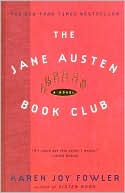
The Jane Austen Book Club, Karen Joy Fowler
This is one of those books I am liking more now that I'm done with it and can think about the characters' experiences with a little distance between us. I didn't fall in love with any of them, didn't really feel compelled by them as I was reading. On one occasion, I found myself checking to see how many more pages I had to get through and was happy to find a huge chunk of pages at the end that were additional materials and not stuff I *had* to read.
But now that I've finished reading it, I am finding that it did plant little seeds of "oh, I did like that" all over my brain and I have to say it is a good read.
The best thing about the book, though, and the thing I appreciated and liked from the get-go, is the way Fowler pays homage to Austen through the structure of her own novel. Each chapter takes a particular Austen book, and uses the theme of that book as the backdrop for the tale of the character hosting the reading group that month. Obviously, if you've read Austen at all, that makes the story lines created by Fowler fairly predictable in nature, but it's still an interesting read.
I have to admit I've yet to get on board with the whole Jane Austen revival that's gone on as of late; there are about eleventy billion books being published today that go back to contemplate Austen's stories from the point of view of another character, or creating new stories branching off where Austen left off. I hesitate to pick any of those up because I have a hard time believing they can even come close to duplicating Austen's style or perfection. They all look like they'd be hokey romantic drivel to me and Austen's novels go so far beyond that, I think it might be insulting to try to pick up where she left off. But I don't think Fowler's book does that at all. She brings some of Austen's themes (and truly she does focus on the romance of Austen's stories in her own recreations, but in a unsentimental way, I think) into a modern circle of people and simply shows the timelessness of Austen's thematic content.
Not going to go down as my favorite book ever, but I enjoyed it nonetheless.
Saturday, August 30, 2008
Straight Up and Fabulous...
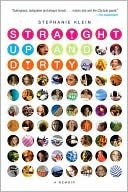
Straight Up & Dirty, Stephanie Klein
Girl crush, right here, my friends. I want to buy this woman a drink and maybe kiss her goodnight.
Klein's candid and almost uncomfortably honest account of getting through and over her divorce is one of the best reads I've had in a long time. When dating a bevy of men ("a pair and a spare") proves unsuccessful, Klein undergoes an at times painful journey of self-discovery that hit close to home in a way I've never encountered through the written word.
I'm finding that memoir is becoming far more riveting to me than fiction--had this book been fashioned about a character, invented inside the mind of a writer, it would have been good, probably great. But the fact that, as I'm reading it, I am constantly aware of the fact that this is a real, flesh and blood woman, sharing her real flesh and blood experience, it makes the act of reading the words a form of communication one just doesn't get with a novel. She could have easily created a character and written a "semi-autobiographical" account of a woman struggling to find herself, "loosely" based on her own life. But the rawness of memoir, especially this one, makes the story that much more alive. This is not a character, but a real woman, one who you might walk by on the side walk, or sit next to at a bar. And she lived this.
Not that it's an extraordinary or unusual experience she's gone through. When I was the age she is in this memoir, I went through a similar sort of experience, although it wasn't as messy as divorce. I went through a similar journey to find a sense of satisfaction, contentment and peace in my life. I knew other women had to have gone through it, too; I knew I was not unique in my grief and in the transformation I went through. But I've never read it before. Never seen it put out there so eloquently and beautifully.
Reading Straight Up & Dirty took me back to that time in my own life, to both the pain of loss and the elation of self-discovery and self-reliance. Tonight as I absorb the last bits of the book into my consciousness, I am so grateful to have picked up the book and to have not only read Stephanie's story, but to have reminded myself of my own journey to the woman I am today.
Tuesday, August 26, 2008
Back on track...
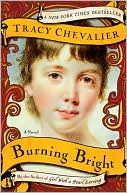
Burning Bright, Tracy Chevalier
Oh. So. Good.
I loved The Girl with the Pearl Earring, so I assumed this book would also capture my attention. Add to that my abject adoration of all stories based in 18-th century London (the more down-trodden or plague-y the better, my friends), and my love of poetry and there was really no other reasonable expectation to have other than that I would fall madly in love with the characters, the setting, the story, the whole nine yards.
And I did. But only after having completed it and having contemplated it for a bit did I really get it. The story is that of the Jem Kellaway, a country boy from Dorset whose family moves to London after a family tragedy. He and his younger sister, Maisie, befriend rough and tumble Maggie Butterfield, the typical, hardened street urchin-y smart mouth who is savvy in the ways of London's seedy underbelly. Together Jem and Maggie befriend the poet William Blake, who lives next door to the Kellaway's, and who seems to see Jem and Maggie as more than simply two kids running through the streets of London looking for mischief.
The tension between opposites, and more importantly, what lies between the poles, is the main motif here. Jem, the country boy to Maggie's city girl. One seemingly representing innocence, the other experience. But as the story unwinds we realize that isn't always the case and that people are, at once, a mixture of these two ideas, depending upon the circumstances in which they find themselves. The loss of innocence, and the multitude of forms that loss can take, plays out over and over again in the pages of the story, each time painfully reminding the reader that pure innocence is fleeting and impossible to replace.
However, this loss of innocence doesn't bring with it only dispair--there are glimmers of hope and happiness sprinkled amidst warehouse fires, mob scene riots and exhausting treks across the country-side.
Initially I was disappointed with the ending of the story--it seemed, well, anticlimactic to me. There was no screamingly big finish--no great tragedy or overwhelming joy. There is the sense, simply, that life will go on for these people. My first impulse was to feel let down. But after a time I realized that this is precisely the intention of the novel--life is not lived in the extreme, in the realm of opposites--it's lived within the space in between those poles, balancing between innocence and experience.
I'm going to miss these characters, but given the conclusion Chevalier created for them, I will probably spend some idle time imaging with the future could possibly have held for them. And I've always thought that's the mark of a good piece of literature.
Monday, August 11, 2008
What? I read.
I just don't seem to be able to remember to write about what I read. But seriously, I do read. Not as voraciously as I'd like to, but I sneak it in there. Soooo, what have I read lately?
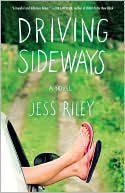
Driving Sideways, Jess Riley
I really enjoyed this; I read it while undertaking a huge cross-country move of my own and appreciated the "gigantic new adventure"ness of it all.
After years of basically waiting to die, main character Leigh is faced with the fact that she just might end up living after all. She receives a new kidney and is given the "okay" to embark upon the coming-of-age adventure that so many of us take for granted, and at an earlier age, even--driving cross country.
She has some pretty serious expectations built up about what this trip will entail--everything from learning more about from where her donated kidney comes, to confronting the mother who left her and her overbearing, begrudgingly over-protective brother years earlier.
It's safe to say that NOTHING is as Leigh expects it to be as she journeys towards a clearer sense of herself and the grown-up she's been given the opportunity to become.
 Yummy Mummy, Polly Williams
Yummy Mummy, Polly Williams
Well, I love me some British chick lit, so I was a sucker for this. I'm sure it had nothing to do with the premise being that of a once svelte and fashionable career woman having morphed into a frumpy, insecure milk-bar of a mother with zero self-esteem and a brooding sense of doom in her relationship. Who could relate to that (well, minus the doomy relationship part)?
I loved this book--it was not, overall, a *deep read* by any means. But I loved watching Amy peel back the layers of her experience as a mother to find the core of her being again. Since having my own child over two years ago, the identity shift a woman experiences when becoming a mother is of particular interest to me. And I found her moment of clarity--a walk in a London park that just happens to be my "happy place" (ah, Regents Park, how I pine for you and my view of the pond from my dorm room)--to be tear-worthy and motherhood/womanhood-affirming. And sometimes, even if it's just a little treacly (which I didn't think it was, but I've read that others did), we need that.
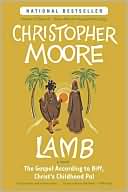
Lamb: The Gospel According to Biff, Christ's Childhood Friend
Christopher Moore
Seriously? So funny. Not being Christian, I'm not sure just how high it would rate on the "irreverent scale". Well, actually, since Jesus was a Jew and most of the knocks are at Judaism, and since I'm a Jew, I guess I didn't find it very irreverent--just freaking hysterical.
Premise? Biff, brought back to life in modern times, is tasked with telling the story of Jesus (um, Joshua) that no one knows. See, Biff was with him during those lost years, the ones when, according to Biff, he and Joshua traveled the East in search of the Magi who visited the manger the night Joshua was born.
This journey forms the basis of Joshua's later teachings and Moore is able to weave Eastern thought and religion into Jesus' message in a way that is effortless and, as absurd as the story can be, makes perfect sense.
Biff is hysterical--apparently he invented sarcasm and is very particular about who uses it and is really pissed off when they mangle it. One doesn't normally picture Jesus roaming the world with an over-sexed (seriously, he's got a thing for Mary. The Virgin Mary) ready-to-fly-off-the-handle sidekick. But in almost every way, it was absolutely perfect.
I was a little disappointed with the ending, but you know, it is what it is. Not like Biff could change all of that dying on the cross thing (although he did try). Interestingly, this book humanized the story of Jesus for me in a way that eleven years of Catholic school couldn't do. I think a bunch of nuns would probably clutch their rosaries in horror at that, but again, I kinda like that.

Driving Sideways, Jess Riley
I really enjoyed this; I read it while undertaking a huge cross-country move of my own and appreciated the "gigantic new adventure"ness of it all.
After years of basically waiting to die, main character Leigh is faced with the fact that she just might end up living after all. She receives a new kidney and is given the "okay" to embark upon the coming-of-age adventure that so many of us take for granted, and at an earlier age, even--driving cross country.
She has some pretty serious expectations built up about what this trip will entail--everything from learning more about from where her donated kidney comes, to confronting the mother who left her and her overbearing, begrudgingly over-protective brother years earlier.
It's safe to say that NOTHING is as Leigh expects it to be as she journeys towards a clearer sense of herself and the grown-up she's been given the opportunity to become.
 Yummy Mummy, Polly Williams
Yummy Mummy, Polly WilliamsWell, I love me some British chick lit, so I was a sucker for this. I'm sure it had nothing to do with the premise being that of a once svelte and fashionable career woman having morphed into a frumpy, insecure milk-bar of a mother with zero self-esteem and a brooding sense of doom in her relationship. Who could relate to that (well, minus the doomy relationship part)?
I loved this book--it was not, overall, a *deep read* by any means. But I loved watching Amy peel back the layers of her experience as a mother to find the core of her being again. Since having my own child over two years ago, the identity shift a woman experiences when becoming a mother is of particular interest to me. And I found her moment of clarity--a walk in a London park that just happens to be my "happy place" (ah, Regents Park, how I pine for you and my view of the pond from my dorm room)--to be tear-worthy and motherhood/womanhood-affirming. And sometimes, even if it's just a little treacly (which I didn't think it was, but I've read that others did), we need that.

Lamb: The Gospel According to Biff, Christ's Childhood Friend
Christopher Moore
Seriously? So funny. Not being Christian, I'm not sure just how high it would rate on the "irreverent scale". Well, actually, since Jesus was a Jew and most of the knocks are at Judaism, and since I'm a Jew, I guess I didn't find it very irreverent--just freaking hysterical.
Premise? Biff, brought back to life in modern times, is tasked with telling the story of Jesus (um, Joshua) that no one knows. See, Biff was with him during those lost years, the ones when, according to Biff, he and Joshua traveled the East in search of the Magi who visited the manger the night Joshua was born.
This journey forms the basis of Joshua's later teachings and Moore is able to weave Eastern thought and religion into Jesus' message in a way that is effortless and, as absurd as the story can be, makes perfect sense.
Biff is hysterical--apparently he invented sarcasm and is very particular about who uses it and is really pissed off when they mangle it. One doesn't normally picture Jesus roaming the world with an over-sexed (seriously, he's got a thing for Mary. The Virgin Mary) ready-to-fly-off-the-handle sidekick. But in almost every way, it was absolutely perfect.
I was a little disappointed with the ending, but you know, it is what it is. Not like Biff could change all of that dying on the cross thing (although he did try). Interestingly, this book humanized the story of Jesus for me in a way that eleven years of Catholic school couldn't do. I think a bunch of nuns would probably clutch their rosaries in horror at that, but again, I kinda like that.
Saturday, May 24, 2008
Such a Pretty Fat, Jen Lancaster

I've never been a big memoir person. I generally don't "do" non-fiction. I plowed through them in lit classes in college because I had a deadline and I have a smattering of memoirs/autobiographies on my bookshelf that I've never read (no doubt the vast majority of them will be purged with this next move in the coming month). So I wasn't sure how I'd feel about reading Jen Lancaster when I started out with her trifecta of wickedly funny memoirs.
Now that I've closed the back page of the last of the three, I am sad. She has chronicled the rise and fall of her fancy shmancy career before becoming a writer, her life in the city and lastly, her battle to gain control of her weight. Each book is hysterically funny on its own, but having read them one right after the other (if life hadn't gotten in the way, I'd probably have inhaled all three in a matter of days---damn all that husband, child, household and friendship junk!)
Since I've never immersed myself in a memoir before, I'm not really accustomed to the feeling of "gee, I'll miss her," in the way I am feeling it right now. Sure, when I finish a piece of fiction, I am left feeling a bit of loss; the characters are gone and most likely never to be seen again, adrift in the space of my memory, probably destined to fade into vagueness (unless we're talking Atticus Finch or Tess of the D'Urbervilles). But this time, I finished the book and was very aware of the fact that the heroine of this particular *trilogy* is still out there, on a daily basis living a life that is fodder for more hysterical writing.
I was also fascinated, this being a memoir, that I could actually find myself saying, "God, I relate so much to this woman." Whether it was her abject love of all things high in calories and saturated fat or the fact that she can handle all aspects of laundry EXCEPT the folding and putting away part (I am SO like that), I found myself saying, "me, TOO!!" in giggly excitement at so many parts of her book, as though I was chatting with a new girlfriend, in that fun "honeymoon" stage of friendship when you're getting to know all of each other's stuff. (I hate the word "stuff", but my brain is fried right now, so please except my apology for using the biggest cop-out word in all of the English language).
I was hugely inspired by her decision to gain control of her body and find her way towards a healthy weight and lifestyle. As I chronicle (poorly) in my other blog, No More Fat Sarah, I have had a life-long conflict with my body and it's insatiable love of yumminess. Her progression from "okay, really, tomorrow I'm going to start the diet....really," to the last page of the book gave me a sense of not being alone. I have no "fat" friends. I am surrounded by lithe, skinny girls who wave their hands dismissively at me when I lament about my weight. Reading this book was like having a friend to kvetch with about it, even though Jen didn't have to actually listen to my end of the kvetch-fest.
I'm impatient for the next book, although I know right now she's still out promoting this one--it only came out a few weeks ago. So until her next book hits the shelves (she'd better be writing one as I type this...), I will have to be content with her blog, www.jennsylvania.com.
As for my next book, I am delving back into the world of fiction with Hanna's Daughters, by Marianne Fredrikkson.

Saturday, May 17, 2008
Bitter is the New Black & Bright Lights, Big Ass, Jen Lancaster
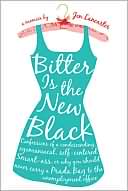
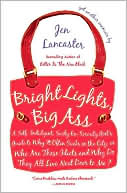
I am not worthy.
Wickedly funny--I routinely annoyed Husband by laughing out loud while he tried to sleep next to me. He was not amused, but it was worth it. Lancaster is, at times, beyond obnoxious, but more often than not says what you'd think, but wouldn't have the balls to say.
I love her. Currently reading her new memoir: Such a Pretty Fat. Will probably comment on it extensively in my fat-girl blog, No More Fat Sarah.

Thursday, April 17, 2008
Posh, Lucy Jackson & Snow Angels, Stewart O'Nan


And the gloom goes on!
I loved both of these books, but DAY-UM! Worlds o' hurt in each one of them.
Posh is the story of several characters whose lives revolve around the elite Griffin School, a private New York high school, filled to the gills with the teenagers of the rich and famous, rife with all the problems that lie under their glossy veneers. Initially I thought it was going to be a sardonic satire that was going to make me laugh grimly at the foibles of the self-important and arrogant. In a way, it did. Please, having taught at a school similar to Griffin myself, I could see parents I have dealt with in the sketches of minor characters, parents who come to complain to Kathryn "Lazy" Hoffman about their daughters giving blow jobs to boys during a house party, off campus, on a Saturday night, expecting the headmaster to be able to actually do something about it. Because god forbid they actually parent their own children, right?
Reminded me of the mother at the school I taught at who actually barred my way from mailing a deadline to the yearbook company until she had a chance to review the quality and quantity of prom pictures that highlighted her daughter.
Or the father who wanted to know why his son received a B+ instead of an A- on a paper and was actually waiting for me, in my class room, when I arrived, expecting me to go line by line through the paper with him---while my class waited.
Or the parents of my student who, for a home work assignment, simply downloaded and printed out Spark Notes, complete with graphics and advertisements, and handed it in as his own work. They took me all the way to the Dean of Students complaining that the zero I gave their son was unfair because when I told the class they had to summarize the three chapters they read for homework, I didn't specify that their summaries had to be in their own words. And the piece de resistance? The Dean agreed with them (they gave buttloads of money to the school), and I had to give the kid an actual grade for his "work".
But Posh is more than just a satirical look at these self-absorbed lunatics. It begins with a loss almost too painful to bear and ends with yet another loss that is a sucker-punch to the gut, even though you could see it coming a mile away. We tend to write off the rich and fabulous as simply that and Jackson's book shows that, if you scratch just a bit below the surface, they are much more. Rife with vulnerabilities, they are far more complex than you'd think by looking at them in all their Neiman Marcus'd glory.
O'Nan's Snow Angels takes you to a completely different world, to lower working-class, small town dysfunction. Told, for the most part, from the perspective of Arthur Parkinson, a teenager stuck in the midst of his parents' divorce, it's the story of relationships unraveling and how those involved cope. Or can't cope. And the extremes they go to when they can't make their lives work outside the realm of those failed relationships.
I clearly loved the misery (this seems to be what I love about literature), but I had a hard time loving the characters. Perhaps that's O'Nan's purpose, since they are all, in some way, very responsible for their own bitter unhappiness in life. But I was only able to wrap my heart around Arthur, mainly out of pure pity for his plight and the stoic way in which he attempts to deal with it all.
He was perfectly drawn as the mortified teenager who so does NOT want to hear his mother prattle on about all of his father's faults and cannot bear to hear his father talk about his new girlfriend, but can't bring himself to tell either of them to shut the fuck up about it. His stoicism and the "too-much-information" he endures at the hands of the very adults who are supposed to protect him highlight how selfish grown ups can be when faced with their own little personal tragedies.
In a 6 degrees of separation twist, he is also entangled in the dysfunction and tragedy that befalls his former childhood babysitter who is dealing with a violent and estranged husband. As if dealing with his parents' maelstrom isn't enough, his connection to Annie is beyond heartbreaking.
While the lives of adults around him shatter, he attempts to forge ahead in his first romantic relationship, the one shining hope in this story that love can conquer, if not all, at least some.
So, now I've taken a bit of a breather from the tragic misery and I'm reading hysterically funny misery, in Jen Lancaster, Bitter is the New Black. Only half way through it, but it is one of the funniest books I have ever, ever read.
Sunday, March 30, 2008
The Memory Keeper's Daughter, Kim Edwards, and Starting Out in the Evening, Brian Morton


D.o.w.n.e.r.s.
My students often asked me, "Ms. S., why do we only read depressing things? Why does a book have to be such a downer in order to be considered great literature?" My answer was always something along the lines of how human nature learns through tragedy and suffering and tends to just absorb joy. Unfortunately, we're not wired to learn from joy, unless it's tempered by pain. It's just who we are.
But man alive, these two books take the cake in the "depressing downers" category. Basic gist of both books: "You're going to die. Period. And you'll probably lose a lot of your dignity in the process. Oh, and all that time you're living before you die? You're basically alone, even if you think you're not. You're going to make major mistakes, float aimlessly most of the time, maybe thinking that what you're doing has some significance in the world. But you're most likely wrong. Maybe you'll be missed when you're gone; maybe you won't be. But you won't know either way, because you'll be dead. Have a nice day!!!"
Not entirely fair, of course. Each book has it's moments of inspiration and hope. But when you're writing a book that is essentially about mortality and what one leaves behind based on the steps they take during life, it's hard not to present a melancholy bleakness to the reader. Hell, only Shakespeare was ballsy enough to toy with the idea that he was made immortal through his writing. The rest of us kind of know, though we don't think of it during the day to day, that we've got a limited amount of time and influence on this earth.
But when you cram that experience down into 300 pages, litter it with hugely bad mistakes like giving away your newborn because she has Downs Syndrome and then telling your wife that baby died, you are concentrating the misery and futility of life into such a small space, it pretty much sucker punches the reader constantly.
I liked both books immensely; I clearly have a soft spot for the gloom. Edwards' Memory Keeper's Daughter takes you through the life of Dr David Henry, starting on the night that he delivers his twins, one of whom has Downs Syndrome. That night changes the course of his life in the most unimaginable way, as he gives his "defective" twin away and tells his wife that the little girl died upon birth. The story that follows weaves the tale of his own family's inevitable disintegration and the story of that cast-off child and the woman who becomes her mother.
I was never able to understand David Henry, or forgive him for the choice he made, beyond rationalizing that he so desperately wanted to create a world of perfection for his wife and a child with special needs marred that image so completely, he had to erase that factor to preserve his ideal. The results are disastrous for all involved (with the exception, ironically, of the Downs child herself and those involved in her life). It was so difficult to watch the unraveling of his family knowing that it all hinged on one bad choice, in one moment of his life. How awful to know that one's entire existence is marked irrevocably by a split second.
Brian Morton's Starting Out in the Evening is about exactly that. Not only is it a title of the main character's unpublished book, it is the idea of examining one's life, while nearing the end of it. At least that's the case for Leonard Schiller, a fallen-by the wayside author, once great, struggling to live long enough to finish his last novel. The others in the novel, a graduate student writing her thesis about Schiller, and Schiller's daughter, are also, though younger, struggling to etch out their identities, to make sense of who they are and what they want in life before it is too late for them.
The book is marked by a sense of such loneliness and the futility of life that I was often surprised by how much I loved the characters. They were so beautifully crafted and rich, I had a hard time always liking them because of their authenticity. When I taught high school, especially the advanced classes, where the literature was more complex and the characters multi-faceted, my students used to struggle with that absence of a clear "good guy" and "bad buy". They wanted the clear cut characterization of the Greasers and the Socs, but they got Gatsby instead, so flawed and sketchy, even though he was our "hero". I tried to explain to them that great literature doesn't draw one-sided characters--there are no "all good" heroes in great writing--what would the challenge be if you knew from the beginning who was going to "win"?
I saw this in Morton's characters. Heather Wolfe, the graduate student, is so well-meaning and desperate to make a good impression, but also is entirely caught up in her own ego, in her attempts to immortalize Schiller through her analysis of him, as though he had ever asked for her attention in the first place. At times I liked her, but at times she made my skin crawl with her phoniness and her need to "fit in" to her niche as an intellectual. But isn't that exactly the struggle of a young, ambitious graduate student (or any young person starting out in their chosen field)? To say and do what one needs to in order to solidify her name among those who can further her purpose while at the same time preserving the innocent passion that drew her to her chosen field in the first place? So, not always likable, but flawlessly drawn.
I loved both books, even though each left me feeling a bit of emptiness and a sense of "well, what does it all mean, then?" Each story was careful to leave the reader with a glimmer of hope and "all is right with the world, even though it will all end and you'll most likely be forgotten". I guess, though, that's the hardest, most painful, lesson for human nature, in all it's arrogance, to absorb and, if my theory holds, that's what makes it great literature in the first place.
Saturday, March 1, 2008
The Birth House, Ami McKay
It WAS a good read, but it was not all that I was hoping for or expecting. I think Ann Enright's The Gathering has ruined me for good in terms of expecting great things in every book I pick up. And as a side note, I heard an interview w/ Enright on NPR a week or so ago and was again mesmerized by the tale of Veronica and her brother, Liam. I am tempted to go read the story again, even though it was only a month ago that I finished it. Enright mentioned bits of symbolism I'd not picked up on (hence the "frustrated" in "Frustrated English Teacher"; I'm losing my analytical edge big time with these episodes of Dora the Explorer and hours at the play ground).
Anyhooo, back to McKay's Birth House. It was an interesting and enjoyable read, but I expected far more from the struggle between Dora Rare and the male obstetrician set on demolishing the tradition of midwifery during the early 20th century in rural Nova Scotia. What I got instead were a few examples of fiesty midwife spunkiness, one potentially explosive situation that is defused when Dora runs to the safety of Boston, where she mingles with her brother's love, who is a suffragette, and her artistic friends (this would be fascinating if it weren't for what Dora leaves behind her in Canada).
Initially I was very hopeful. The writing is beautiful, if not made of the same ethereal melancholy of Enright. We find Dora Rare, the only girl born to the Rare family in decades, learning the tradition of midwifery from the enigmatic Mrs. Babineau. There are hints that Mrs. B. fluctuates in the town's opinion from miracle worker to witch, a common dilemma faced by midwives throughout history. But even Mrs. B. gives up without much of a fight and Dora's thrust into the struggle against modern medicine on her own.
Far more time than I was hoping for was spent on Dora's personal life, or lack thereof. Had the story not held the promise of the great battle between the age-old tradition of women catching babies and the modern practice of child-birth as medicine, perhaps Dora's craptastic marriage and quest for a man to love her and for becoming a mother in her own right, would have been enough.
But as a woman who ended up with a c-section after only 9 hours of labor, and who sometimes still wonders "what if...", and who bristles against the idea that pregnancy is a medical condition and needs to be treated as such, I really wanted to see the midwife kick some serious OB ass. And it was just too neat a finish for me. No knock down, drag out, fight to the finish for the hearts and uteri of the women of Scot's Bay.
I did love the merry coven of knitters that Dora surrounds herself with and how they bond over cups of tea full of what essentially amounts to RU-486, circa 1919. After years of dropping babies left and right because their husbands can't respect their bodies well enough to leave them alone two days out of the month, the women take matters into their own hands. I loved that. And I loved how Mrs. B and Dora, in their roles as midwife, become the secret keepers of the town. They are vaults of the secret truths of the town's women; even those who scoff at them in public privately rely on them in times of trouble. These relationships were the most redeeming part of the book.
I will say I learned some interesting factoids, too; perhaps I'd been living under a rock, but I had no idea that vibrators were used in the early 20th century as a treatment for the diagnosis of "female hysteria".
To that end, I will say one other thing for McKay's book; it does a FABULOUS job of making the obstetrician look like a completely ignorant dumbass, and I loved that. He misses what is, though it is never called such, clearly a case of impending pre-eclampsia that made me twist in my seat with anxiety.
Had there been a little less about the marriage and a little more intensity in the struggle of midwife vs doctor, this book would have likely been one of my favorites.
Anyhooo, back to McKay's Birth House. It was an interesting and enjoyable read, but I expected far more from the struggle between Dora Rare and the male obstetrician set on demolishing the tradition of midwifery during the early 20th century in rural Nova Scotia. What I got instead were a few examples of fiesty midwife spunkiness, one potentially explosive situation that is defused when Dora runs to the safety of Boston, where she mingles with her brother's love, who is a suffragette, and her artistic friends (this would be fascinating if it weren't for what Dora leaves behind her in Canada).
Initially I was very hopeful. The writing is beautiful, if not made of the same ethereal melancholy of Enright. We find Dora Rare, the only girl born to the Rare family in decades, learning the tradition of midwifery from the enigmatic Mrs. Babineau. There are hints that Mrs. B. fluctuates in the town's opinion from miracle worker to witch, a common dilemma faced by midwives throughout history. But even Mrs. B. gives up without much of a fight and Dora's thrust into the struggle against modern medicine on her own.
Far more time than I was hoping for was spent on Dora's personal life, or lack thereof. Had the story not held the promise of the great battle between the age-old tradition of women catching babies and the modern practice of child-birth as medicine, perhaps Dora's craptastic marriage and quest for a man to love her and for becoming a mother in her own right, would have been enough.
But as a woman who ended up with a c-section after only 9 hours of labor, and who sometimes still wonders "what if...", and who bristles against the idea that pregnancy is a medical condition and needs to be treated as such, I really wanted to see the midwife kick some serious OB ass. And it was just too neat a finish for me. No knock down, drag out, fight to the finish for the hearts and uteri of the women of Scot's Bay.
I did love the merry coven of knitters that Dora surrounds herself with and how they bond over cups of tea full of what essentially amounts to RU-486, circa 1919. After years of dropping babies left and right because their husbands can't respect their bodies well enough to leave them alone two days out of the month, the women take matters into their own hands. I loved that. And I loved how Mrs. B and Dora, in their roles as midwife, become the secret keepers of the town. They are vaults of the secret truths of the town's women; even those who scoff at them in public privately rely on them in times of trouble. These relationships were the most redeeming part of the book.
I will say I learned some interesting factoids, too; perhaps I'd been living under a rock, but I had no idea that vibrators were used in the early 20th century as a treatment for the diagnosis of "female hysteria".
To that end, I will say one other thing for McKay's book; it does a FABULOUS job of making the obstetrician look like a completely ignorant dumbass, and I loved that. He misses what is, though it is never called such, clearly a case of impending pre-eclampsia that made me twist in my seat with anxiety.
Had there been a little less about the marriage and a little more intensity in the struggle of midwife vs doctor, this book would have likely been one of my favorites.
Sunday, February 17, 2008
Oh yeah, I have a book blog...
Leave it to Margaret Atwood to totally annihilate my momentum. This is the third Atwood book I've started and attempted to muddle through and I guess I am just a bad feminist reader because damn if her books don't make me want to rip my hair out. It's her bizarre mixture of science-fiction futuristic societies blended with endless descriptions of frail, powdery, paper-thin old lady skin that makes me want to gouge my eyes out.
So I put The Blind Assassin down and have been pouting ever since. I hate not finishing a book. I've done a ton of first-page hopping in the past month because when I give up on a book, I become ravenous for others, but I can't commit to any.
It's seriously like getting over a failed relationship for me. After ditching a book I really had hoped would be a great read for me, I flit from one book to another, reading a page or two to see if it will appease me (generally fluffy chick lit in this situation) in my disappointed state. This time, though, I attempted to flit from Booker winner to Booker winner and that is just a brain-fuck; too deep, too intense, too demanding when I'm simply looking for a rebound from a bad read.

I've finally settled on Ami McKay's The Birth House, which is essentially the story of a midwife-in-training dealing with the infiltration of modern medicine and a male obstetrician in her domain.
It is a wonderful mix of a girly drama and historical fiction. Thus far I am enjoying it immensely, as it's feeding my "rebound" need as well as offering some actual literary quality, as opposed to my usual Bridget Jones-y type selections when in this frame of mind.
I have many thoughts on the book itself and the topic it covers, but I think I'll save it until I'm farther into the book.
So I put The Blind Assassin down and have been pouting ever since. I hate not finishing a book. I've done a ton of first-page hopping in the past month because when I give up on a book, I become ravenous for others, but I can't commit to any.
It's seriously like getting over a failed relationship for me. After ditching a book I really had hoped would be a great read for me, I flit from one book to another, reading a page or two to see if it will appease me (generally fluffy chick lit in this situation) in my disappointed state. This time, though, I attempted to flit from Booker winner to Booker winner and that is just a brain-fuck; too deep, too intense, too demanding when I'm simply looking for a rebound from a bad read.

I've finally settled on Ami McKay's The Birth House, which is essentially the story of a midwife-in-training dealing with the infiltration of modern medicine and a male obstetrician in her domain.
It is a wonderful mix of a girly drama and historical fiction. Thus far I am enjoying it immensely, as it's feeding my "rebound" need as well as offering some actual literary quality, as opposed to my usual Bridget Jones-y type selections when in this frame of mind.
I have many thoughts on the book itself and the topic it covers, but I think I'll save it until I'm farther into the book.
Saturday, January 19, 2008
Booker #3: The Blind Assassin, Margaret Atwood

Sigh. I am not nearly the sophisticated reader I once was. I've never really been able to enjoy Atwood (probably because the movie version of The Handmaid's Tale freaked me out to no end and I could never get past that), but I am really trying here. It starts with the main character describing her sister's death (an apparently suicidal joy ride off the side of a bridge) and the novel the sister has left behind, which she posthumously publishes.
So far the book is a surreal combination of this novel within a novel and a smattering of newspaper clippings of obituaries also pertinent to this main character's life. The obituaries are quite interesting; the novel within a novel? Well, it's a weird mixture of a torrid love affair and a freaky sci-fi, otherworld where horrible social conditions drive people to heinous crimes, apparently.
It is a looooong read and fairly slow, so I wouldn't expect to hear from me here anytime in the next week or so. I hope to get through it because I really feel like at 36 years old, I really should be able to say I've read at least one Atwood novel. Sigh.
Wednesday, January 16, 2008
Slim Pickin': Skinny, Ibi Kaslik
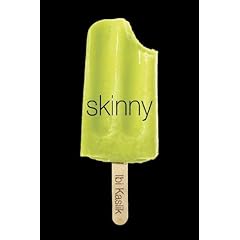 I was drawn to this book because, as a chubby girl, eating disorders have always fascinated me in a twisted kind of way. The book is the story about a perfectionist medical student with daddy issues (shockingly, she's the one with the eating disorder) and her younger, athletic, academically-apathetic sister, who magically has the perfect relationship with the daddy in question.
I was drawn to this book because, as a chubby girl, eating disorders have always fascinated me in a twisted kind of way. The book is the story about a perfectionist medical student with daddy issues (shockingly, she's the one with the eating disorder) and her younger, athletic, academically-apathetic sister, who magically has the perfect relationship with the daddy in question.It's not a bad book; it's actually listed for many Canadian book awards, from what the back of the cover says. Eh. I didn't really see anything award-worthy, although the final pages give themselves over to a poetic tone that is far lovelier than anything else in the book.
The book, in my opinion, tries to do too much. It's narrated in alternating chapters by the two sisters, which can be wonderful (think Joy Luck Club), but here it just takes away from the older sister, Giselle's, story because she is, after all, the main character. Holly, the younger of the two, just kind of lets us know about how her sister's problems are wreaking havoc on her life and oh, yeah, the ghosts. She sees ghosts. That part is never entirely fleshed out.
Neither is the boyfriend, really. I never quite understand his motivation for his feelings for the girls and I didn't really find him necessary to the plot.
I wanted something, if you'll pardon the term, meatier. I wanted to learn more about anorexia and the mindset that goes along with it. I already know about perfectionism and daddy issues. I wanted it to go deeper; for the character to come more to life for me. Perhaps only because Giselle's chapters were constantly interrupted by her sister's, I never felt connected to her or the story.
I guess it's from having picked this book up randomly after having poured myself into two Booker Award winners; this book isn't bad at all. It's a good read. But it's not Enright or Doyle and I couldn't help but hold that against it while I was reading.
Saturday, January 12, 2008
Sob-Fest
Yeah, Paddy Clarke Ha Ha Ha broke my heart. I had forgotten the ending and even when I knew what was going to happen, when it it finally did, I was sad beyond words.
There is little in this world as tragic as a child's mind trying to grapple with adult issues and adult relationships, struggling to make sense of the angry words that fly across the dinner table, above his head. Childhood's innocence is fragile as an egg, and this kid's innocence is just cracked all to hell, way before it's time. The conflict in his mind and heart as to whose "fault" it all is and how can he lay blame on the two people he loves the most, is just wrenching.
There is little in this world as tragic as a child's mind trying to grapple with adult issues and adult relationships, struggling to make sense of the angry words that fly across the dinner table, above his head. Childhood's innocence is fragile as an egg, and this kid's innocence is just cracked all to hell, way before it's time. The conflict in his mind and heart as to whose "fault" it all is and how can he lay blame on the two people he loves the most, is just wrenching.
Saturday, January 5, 2008
Booker #2: Paddy Clarke Ha Ha Ha, Roddy Doyle
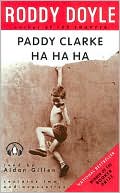
I read this book a decade or so ago, but I swear I remember nothing of it save that I liked it and I vaguely feel like it made me cry.
I have to say, it's like Lord of the Flies and "A Christmas Story" rolled into one thus far. The story of Patrick Clarke and his little brother, Sinbad, and all their friends in this seemingly down-trodden Irish town slowing being taken over by the Corporation, is rife with random acts of compulsive violence and "triple dog dare you"'s that make the mother in me cringe. At the same time, the armchair therapist in me is trying to figure out where their pent-up, seeping rage comes from that they feel the need to constantly beat the snot out of each other for a laugh.
It's actually not hard to figure out, come to think of it. There are a bevy of reasons these young boys would feel and then bury their angst, given the circumstances of their lives.
A couple hundred pages to go and, like I said, I am fairly certain this one's going to make me full-on cry like a little girl.
Wednesday, January 2, 2008
The Gathering, Anne Enright--Booker Prize winner 2007
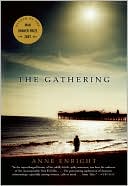
Wow. What started as a vaguely ethereal, esoteric rambling about an invisible mother, turned into one of the most brutally painful and beautifully written stories of loss and hoped-for redemption I've ever read.
The main character, Veronica, spends a lot of time musing about her family; its past, in part how she imagines it and in part how she remembers it, and it's present, as she feels it. Her "Irish twin" brother has passed away and as the family gathers to mourn (whether it's real grief or obligatory in nature), she is forced to face a gut-wrenching memory that clarifies for her everything that has ever seemed "off" about the people she loves, including herself.
I really didn't expect to like it. It had a Virginia Woolf-eque stream of consciousness initially that has always turned me off. I am fascinated by the life of Woolf; I love the idea of Woolf, but not so much the words of Woolf. So I expected to have to trudge my way through this, semi-congratulating myself all the way for being a reader of such lofty and ambitious literature. But by page 100 or so, I was finding myself wishing for a spare minute in the day so I could steal a few pages, dying to know what happens next; not so much in an action driven sort of way, but in the sense that I just loved this narrator, was broken hearted for her, and wanted to spend a few more minutes with her.
I was satisfied when it was over, but truly wanted to know what happened next. I spent some time envisioning what would happen after the closing pages, had Enright chosen to take her story into the next chapter of this woman's (and her family's) life. This is one that will resonate with me for quite some time.
Subscribe to:
Comments (Atom)



